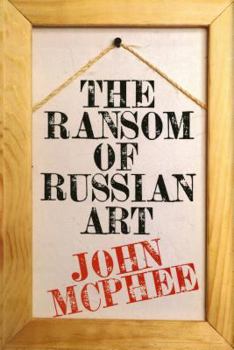The Ransom of Russian Art
Select Format
Select Condition 
Book Overview
John McPhee's The Ransom of Russian Art is a suspenseful, chilling, and fascinating report on a covert operation like no other. It offers unprecedented insight into Soviet culture at the brink of the Union's collapse.
In the 1960s and 1970s, an American professor of Soviet economics forayed on his own in the Soviet Union, bought the work of underground "unofficial" artists, and brought it out himself or arranged to have it...
Format:Hardcover
Language:English
ISBN:0374246823
ISBN13:9780374246822
Release Date:December 1994
Publisher:Farrar, Straus and Giroux
Length:181 Pages
Weight:1.00 lbs.
Dimensions:0.7" x 5.7" x 8.6"
Customer Reviews
2 ratings
Mr. Magoo smuggles art out of a dictatorship and creates the only real collection of an era
Published by Thriftbooks.com User , 18 years ago
The Ransom of Russian Art, by John McPhee. McPhee is a Pulitzer Prize winner who in the past has specialized in geology but really can write anything that has real people in real situations (e.g., Giving Good Weight and Looking for a Ship). In this book a chance encounter with a truly eccentric man on a train leads to a story about -- an unparalleled rescue from the Soviet Union, not of Jews, not of intellectuals, not of political dissidents or of oppressed minorities, but of the canvases of dissident artists. The leading character is Norton Townshend Dodge. He is so well detailed by McPhee and his on words, and so far off the bubble from a boring American standard, that he must surely be a bit self aware and self-inventing. Mysterious money (basically the story is that the family knew Benjamin Graham and paid attention to him), academic economic curiosity coupled with an interest in art, a way of blundering around that worked in the U.S.S.R for no apparent reason, too many friends and acquaintances that were in the CIA, and a strange moldering estate in America that housed the only significant collection of Soviet dissident art in the world - what's not to like? The portrayal of the Russian artists is less compelling, either because McPhee had less contact and a looser type of relationship with the artists after the fact, or because these artists are largely lost without the suppressing force of authority to define their art and ideas. There are some lovely sections that show fear, jealousy (beating up a rival lover and throwing her papers into the lions' den of the Moscow zoo), alcoholism, the need to hide and the need to show. Others' opinion of Dodge is both amusing and makes him more multi-dimensional. In the end, Dodge was one of the few forms of subsidization and patronage that kept a select, but large, number of Soviet artists alive and in vodka. The lovely color plates of select Dodge paintings show a bewildering number of styles and a vibrant culture of hidden art. Perhaps creativity does feed off crisis and suppression. Buy this book, but give it to a good friend.
Buff writing about emotion and tragedy
Published by Thriftbooks.com User , 24 years ago
An eccentric American professor of economics, Norton Dodge, travels throughout the Soviet Union during the 1960s and `70s and into the `80s. He spends several million dollars on dissident art, smuggling it out of the country, in deep violation of Soviet law but not the US's. John McPhee reports on the story, after the fact, and includes vivid descriptions of the artists and their relationships with one another, Dodge and the Soviet state. The Soviet state, of course, is the hulking force behind the story, responsible for making the artists dissidents and causing various among them, from time to time, to disappear or die. So McPhee asks Dodge how he managed to assemble the collection. Was Dodge a representative of the KGB? the CIA? McPhee defers to Dodge's explanations, but McPhee's recounting of his conversation with Dodge about CIA involvement in the American Association for the Advancement of Slavic Studies may engender in the imagination of some readers a hint of the suspicion and paranoia that suffused the culture that originally created the art. About Norton Dodge and his collection (now housed at Rutgers University), the poet Konstantin Kuzminsky says, "Norton thinks art is international. I insist it's purely national." "Americans are afraid of everything which causes too much emotion and tragedy. That is the problem between East and West." Which suggests the gulfs in passion and experience separating this story of Russian art from the trig completeness suggested by McPhee's prose. Bob Niles






